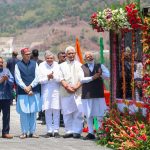 Foreign policy analysts in Delhi have often been frustrated in their attempts to decipher India’s policy towards the Middle East – a region that supplies two thirds of our energy supplies, employs over 6 million Indians and accounts for over 110 billion dollars of trade.
Foreign policy analysts in Delhi have often been frustrated in their attempts to decipher India’s policy towards the Middle East – a region that supplies two thirds of our energy supplies, employs over 6 million Indians and accounts for over 110 billion dollars of trade.
Indian government has often been convulsed into action only when there are coups, wars (civil and uncivil) and other disasters in the region essentially to repatriate the stranded Indians back home. In most cases, Indians have resisted repatriation until kidnapped or faced with imminent death, and on return have promptly started demanding unpaid wages and arrangements to return to another country in the region to work on similar terms. This certainly is no policy- making and setting up a separate Ministry for Overseas Indian Affairs has not helped anyone overseas.
The Ministry of External Affairs has always dealt with each country individually, wishing that its relations with others in the region will not impact on it. Foreign policy, besides the shaping of bilateral relations also includes our response to multi-lateral fora, either by being in it or out of it. Long ago, India made an attempt to get into the OIC (Organisation of Islamic Countries) on the grounds that it had the second largest Muslim population in the world and was roundly rebuffed for not being ‘Islamic’ enough. We should be glad for that!
While foreign policy should be country-specific, it also needs to have an underpinning in some ‘world -view’ that is either enunciated or implicitly conveyed through consistent support to certain principles or interests. It should also convey our approach to that region. We should be clear in our focus as to who we consider a ‘Power’ in the region and who an inconsequential player. We may have considered, quite rightly so, Iran as a ‘Power’ in the region. It is critical for our policy in Afghanistan and Pakistan, besides being an energy supplier. But the realisation that Iran going nuclear was not in our interest came about only after much prodding by the US and that too after we had signed the ‘civil nuclear deal’ with the Bush administration in 2005. Could we not have independently stated our interest either to Iran or the region, without having been seen as succumbing to American pressure? Our vote in the IAEA against Iran in late 2005 made us not only untrustworthy to Iran, but also a suspect member of the NAM (Non-Aligned Movement). The NAM members saw us as having clearly climbed on to the American bandwagon. That may not have been so, but perceptions do matter in relations between countries. An attempt to correct the impression was made by Prime Minister Manmohan Singh attending the NAM summit in Tehran (August 2012), reportedly against the advise of the US administration, but by that time, the Indo-US Nuclear deal was already unraveling.
Throughout the period of American and European sanctions against Iran, we told the Iranians that we were helpless, while systematically reducing our oil imports and getting waivers from the US administration. We were caught flat-footed when an Israeli diplomat was attacked, apparently by an Iranian militia man, in the heart of Delhi, and the Israelis piled pressure on us to bring him to book and Iran simply refused to cooperate in our investigations. We never conveyed our displeasure to Iran for bringing their war against Israel to the heart of Delhi. If they are our friends, we should have clearly told them, ‘you go and attack Tel Aviv, but don’t mess up Delhi.’
Our policy towards Saudi Arabia is as opaque as that country. Though it is our largest supplier of oil and the largest employer of Indians, we have nothing in common with them, either in the region or in the world at large. We are not happy either with their proximity to Pakistan or their hostility towards Iran. We do not endorse their sponsorship of Wahabism, nor their support to extremist groups that morph into terror groups engaged in toppling stable and secular regimes in the region. Recently, Saudi Arabia had started handing over Pakistani terrorists to India, who after committing acts of terror in India were being sent there by the ISI for safety and deniability of their presence in Pakistan. This Saudi act of generosity, which must have greatly upset Islamabad, was reportedly done under the pressure of the US that wanted to teach a lesson to the ISI for its duplicity in the War on Terror. Whether this can be claimed as our foreign policy triumph is debatable.
Being a democracy, we were averse to supporting either monarchies in the Gulf or the dictatorships in Iraq, Libya and Syria, but we were certainly not in the business of toppling either form of political set-up. Hence our unease with the efforts of the US, France and Britain in toppling the non-Sunni secular dictatorships, in the name of democracy and human rights, while keeping the medieval Sunni monarchies intact. Despite being the ‘Righteous Republic’ with an acute moral conscience, we lost friends, one by one, in the region. Iran really does not trust us, Saudis do not want our advice and the ones that sought our help have all but disappeared.
 Our policy towards Israel, largely shaped by the Nehruvian paradigm of supporting the Palestinian State (that was the only ’cause’ we supported in the region) against an imperialist design, is struggling to be re-shaped now, torn as it is between our national interest (defence ties with Israel) v/s appeasement of Indian Muslims. Our relations with Israel are new while our support to the Palestinians has been a part of our anti-colonial, anti- imperialist struggle.
Our policy towards Israel, largely shaped by the Nehruvian paradigm of supporting the Palestinian State (that was the only ’cause’ we supported in the region) against an imperialist design, is struggling to be re-shaped now, torn as it is between our national interest (defence ties with Israel) v/s appeasement of Indian Muslims. Our relations with Israel are new while our support to the Palestinians has been a part of our anti-colonial, anti- imperialist struggle.
Interestingly, our relationship with Israel today is far more muddled than the attitude of Gulf monarchies towards Israel. They regularly send their contributions to the widows of the Hamas fighters without ever raising a voice against the atrocities of Israel. Nor do they ever send their mercenary forces for a ‘Jehad’ against the Jewish state, as they would rather concentrate on eliminating their non-Sunni Muslim compatriots for now. They were even willing to assist Israel if it decided to cut the ‘head of the snake’ (Iran), as the Saudi royals confided to the US. We have no such evil designs on the region, yet we are so diffident even to uphold what we believe is right. India, which is neither pro-Israel nor anti-Israel gets the raw end of the stick and appears worse off than the Gulf monarchies, because of its limited defence deals with Tel Aviv.
The problem with all these relationships is that they are all transactional and miss the key element of commonality of interests, ideals or principles. They are unavoidably transactional, important nevertheless, but not critical enough to build strategic partnerships and face the region or the world together. There is no more Arab nationalism, no more Nasser and Nehru to stand united against the imperial designs of the West. Does it mean that we have nothing in common with the Middle East? To wit, can India today be on the same page as Iran, Saudi Arabia and Israel in any forum? That seems impossible. The three of them cannot be on the same page, forget India.
So, does our foreign policy have to be as fragmented as the region? Probably not. One could start by enunciating a few guidelines that are minimalist; that we are against religious extremism of either sect, we are against terrorist groups threatening established states, we do not support redrawing of maps either by external force or by sponsored insurgencies and that we strongly condemn disproportionate use of force by Israel against unarmed civilians in Gaza. Is that too much to ask? Even if we are not on the same page, they will know where we are.
The views expressed in this article are solely those of the author.
(Courtesy: ORF)
Author Profile
- India Writes Network (www.indiawrites.org) is an emerging think tank and a media-publishing company focused on international affairs & the India Story. Centre for Global India Insights is the research arm of India Writes Network. To subscribe to India and the World, write to editor@indiawrites.org. A venture of TGII Media Private Limited, a leading media, publishing and consultancy company, IWN has carved a niche for balanced and exhaustive reporting and analysis of international affairs. Eminent personalities, politicians, diplomats, authors, strategy gurus and news-makers have contributed to India Writes Network, as also “India and the World,” a magazine focused on global affairs.
Latest entries
 DiplomacyOctober 4, 2025UNGA Resolution 2758 Must Not Be Distorted, One-China Principle Brooks No Challenge
DiplomacyOctober 4, 2025UNGA Resolution 2758 Must Not Be Distorted, One-China Principle Brooks No Challenge India and the WorldJuly 26, 2025MPs, diplomats laud Operation Sindoor, call for national unity to combat Pakistan-sponsored terror
India and the WorldJuly 26, 2025MPs, diplomats laud Operation Sindoor, call for national unity to combat Pakistan-sponsored terror India and the WorldJuly 25, 2025When Fire Ends, Diplomacy Begins
India and the WorldJuly 25, 2025When Fire Ends, Diplomacy Begins India and the WorldJuly 16, 2025Operation Sindoor and its Aftermath: India’s Successful Diplomatic Outreach
India and the WorldJuly 16, 2025Operation Sindoor and its Aftermath: India’s Successful Diplomatic Outreach







